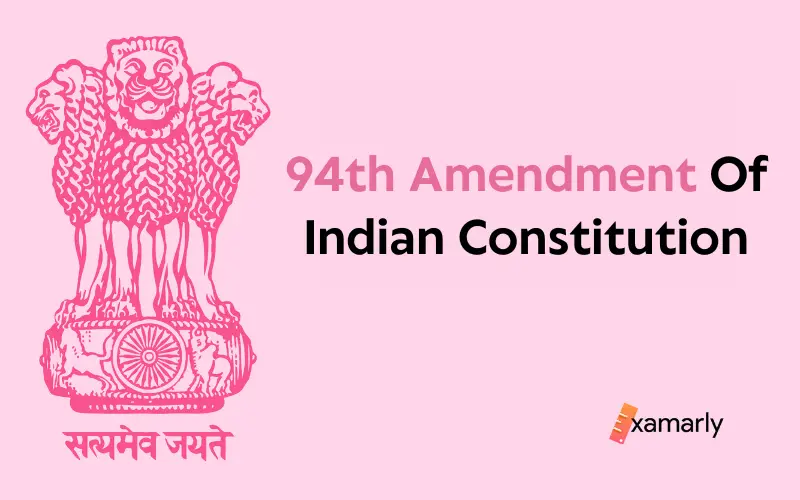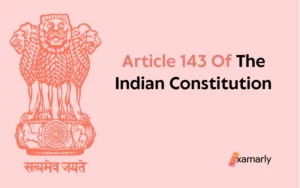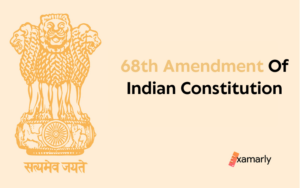In 2000, India gave birth to two new states namely – Jharkhand and Chhattisgarh. Given that Jharkhand and Chhattisgarh are two states with a high concentration of tribal people, the 94th amendment of Indian Constitution included a provision requiring the appointment of a Minister of Tribal Welfare. Today, both states have their ministers, governing the needs of these tribal groups.
In accordance with the amendment, the Indian territories of Jharkhand and Chhattisgarh will also include the states of Madhya Pradesh and Orissa. They have been designated a Minister of Tribal Welfare.
Salient Features And Facts
- The new states of Jharkhand and Chhattisgarh were established. These states were established under the Bihar Reorganisation Act of 2000 and the Madhya Pradesh Reorganisation Act of 2000, accordingly.
- In accordance with the amendment, the Indian territories of Jharkhand and Chhattisgarh which also include the states of Madhya Pradesh and Orissa, designated a Minister of Tribal Welfare.
- The words “Chhattisgarh, Jharkhand” shall be substituted for the words “Bihar” in clause (1) of the proviso of Article 164 given in the Indian Constitution.
Date Enacted
- 94th amendment of Indian Constitution was legally enacted on 22 May 2006.
- The Lok Sabha debated the amendment on May 17, 2006. discussed22, 2006, and the Rajya Sabha concurred at the same time. The law was signed into law on June 12, 2006, under the administration of then-President Abdul Kalam.
- The Gazette of India published a notice about it on June 13, 2006.
Related – 96th Amendment Of Indian Constitution
Statement Of Objects And Reasons
- According to the proviso to clause (1) of Article 164 given in the Indian Constitution, each state or territory shall have a Minister in charge of tribal welfare, who may also be in charge of the welfare of Scheduled Castes and Backward Classes or any other assignment.
- The individual Territories of Chhattisgarh and Jharkhand were established by the Madhya Pradesh Reorganization Act of 2000 and the Bihar Reorganization Act of 2000, which take effect on November 1 and November 15, correspondingly.
- Following the formation of the states of Chhattisgarh and Jharkhand, a substantial chunk of the Scheduled Areas of the former state of Madhya Pradesh were transmitted to Chhattisgarh, and the whole Scheduled Areas of the former Bihar State were relocated to the newly established Jharkhand State, and the Scheduled Areas were redefined in accordance with the Scheduled Areas (States of Chhattisgarh, Jharkhand, and Madhy (C.O. 192).
- Because there are no Scheduled Areas in Bihar and the Scheduled Tribes constitute a very small proportion of the population, it is postulated of excluding Bihar from the scope of the said proviso and to broaden the provisions of clause (1) of Article 164 to the newly established States of Chhattisgarh and Jharkhand.
Prominent People Involved
The modification was proposed by Shivraj Patil, who was the minister of home affairs at the time. On June 12, 2006, the legislation was approved by then-President Abdul Kalam and went into effect.
Important Provisions In 94th Amendment Of Indian Constitution
- According to the provisions to clause (1) of Article 164 of the Constitution, there must be an Official in charge of tribal wellbeing in the Indian territories of Bihar, Madhya Pradesh, and Orissa. This minister could also be in charge of the welfare of the Scheduled Castes and Backward Classes and any other operation.
- The Madhya Pradesh Reorganization Act of 2000 and the Bihar Reorganization Act of 2000, both taking force on November 1 and 15, correspondingly, created an entirely new State of Chhattisgarh and Jharkhand.
- The Scheduled Areas (States of Chhattisgarh, Jharkhand, and Madhya Pradesh) Order, 2003 restructured the Scheduled Areas following the formation of the States of Chhattisgarh and Jharkhand. Chhattisgarh received the entirety of the Scheduled Areas from the previous state of Bihar and a sizable section of the Scheduled Areas from the erstwhile state of Madhya Pradesh.
Ratification
On May 17, 2006, the Lok Sabha debated the proposal. It was then adopted on May 22, 2006, and the Rajya Sabha also gave its nod at the same time. On June 12, 2006, then-President Abdul Kalam signed the bill into law, making it effective immediately. On June 13, 2006, it appeared in The Gazette notification.
Summing Up
According to the Constitution (Ninety-fourth Amendment) Act, 2006, popularly called the 94th amendment of Indian Constitution there should be a minister in charge of tribal welfare in the states of Chhattisgarh and Jharkhand.
The Constitution (One Hundred-Fifth Amendment) Bill, 2006, was introduced in the Lok Sabha on March 1 by Shivraj Patil, who was the minister of home affairs at the time. He introduced the bill.
The Lok Sabha took up the measure on May 17, 2006. It was finally approved on May 22, 2006. On May 22, 2006, the Rajya Sabha approved it. On June 12, 2006, the legislation was approved by then-President A. P. J. Abdul Kalam and went into effect.
FAQ’s
What is 94th Amendment Act, 2006?
Bihar was released from the requirement to have a minister for tribal welfare under the Constitution (94th Amendment Act, 2006), and Jharkhand and Chhattisgarh received the same relief. According to article 164, Jharkhand, Chhattisgarh, Madhya Pradesh, and Odisha are now included in the scope of this provision.
Which new states were formed under the 94th amendment to the Indian Constitution?
Jharkhand and Chhattisgarh were the two recently formed states. The entire allotted territory of Madhya Pradesh was moved to Chhattisgarh as a result of the restructuring of the Indian provinces of Chhattisgarh and Jharkhand.
Who introduced the 94th Amendment of Indian Constitution?
The 94th Amendment to the Indian Constitution was proposed by the minister of home affairs at that time, Shivraj Patil.






